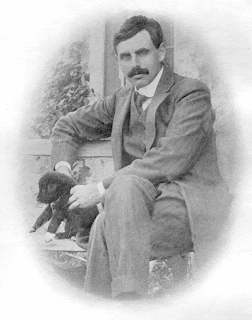And now, on to your regularly scheduled review.
This year A. S. Byatt has come out of almost nowhere to become one of my favourite writers. For quite a while after I read Possession I was afraid to read anything else by her, in case she was only pretending to be amazing, but then I took the plunge with Ragnarok and then The Children's Book and it turns out that A. S. Byatt is always amazing, consistently so, until it's almost depressing. I think I've said this before, but the woman does not let up.
I'm not sure if I'm more in love with her style or the things she chooses to write about. She's got a fierce eye for colour and a weird, intricate turn of phrase that makes the reader really able to see the mad things she imagines - in the two stories that make up Angels and Insects, for example, we get a girl with a dress covered in live butterflies and a supernatural visitation from something like a giant glass vase on fire. She creates these fantastic pocket universes, boiling over with life, each of them full of stories within stories, and tiny little stories within those, like Victorian curiosity cabinets. There's so much to look at in her books, and so much to think about, too.
Byatt (who is interested in everything, almost exhaustingly so) likes to go both enormously big and incredibly small, just to keep you on your toes, and Angels and Insects manages to be about Natural Selection and an anthill, the whole of the Afterlife and a drawing-room seance. Byatt loves the Victorians - for everything that was strange and wrong about them as much as for everything they did right - and (luckily for me) her idea of their greatest hits is very similar to my own. Animals and ghosts! Tennyson and ferocious jungles full of lurking wild beasts! Sex and death and really great dresses!
The two stories that make up Angels and Insects - 'Morpho Eugenia' and 'The Conjugal Angel' are two gorgeous pieces of Victoriana, but Victoriana with teeth. In 'Morpho Eugenia', about a naturalist who falls in love with his patron's whiter-than-white daughter, the characters aren't just compared to insects. In an undefinably creepy way they actually become them. Eugenia, object of William's affections, begins as a butterfly and then morphs into an enormous Queen of the Ants, with the house itself her anthill and all the other female characters her workers.
'The Conjugal Angel', meanwhile, tells the story of a medium and a seance, but a seance where the supernatural beings the characters call up are disgustingly real. Apart from the burning vase-creature, there's a ghost who appears to the medium in her room, 'his brows and lashes caked with clay', a nasty image that sticks in your head because it makes an uncomfortable amount of logical sense. If ghosts are a manifestation of the dead, and the dead are rotting away in the ground - well, you see where this is going. When the angel appears at the end of the story, it's not an attractive Biblical being but an unpleasantly literal representation of Plato's idea that each person is half of an eternal whole. One half of it is shiny and bird-like, and on the other -
On the other side, turned into the shadow, it was grey like wet clay, and formless, putting out stumps that were not arms, moving what was not a mouth in a thin whisper.Nightmares for days.
There are plenty of stories like 'Morpho Eugenia' and 'The Conjugal Angel' written during the Victorian Era, or at least written about the same topics, but at the same time you won't find anything with quite the same slant to them. They're Victorian pastiches, sure, but at the same time they're a lot more than that. Byatt's adept at using Victorian writing styles, which is impressive enough, but you always know you're not just reading another Victorian novel. In Angels and Insects, Byatt has taken two not-particularly-original ideas and used her incredible imagination to turn them into stories that are both lively and unexpected. There are several twists in each tale that I won't spoil you for, but if you know your Victorians you'll be delighted and if you don't - well, you'll still be delighted.
Can I get an A. S. Byatt altar set up in this blog already?
4.5 stars.






